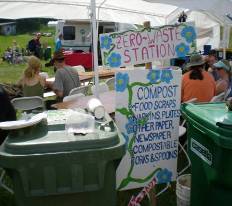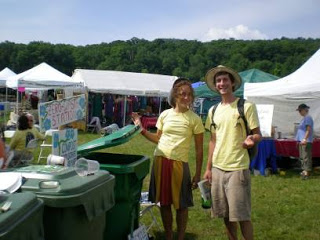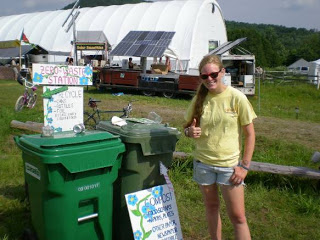May 22, 2012
I said it—the "Z" word!

For me, special events are a perfect opportunity for introducing the topic of zero waste in a community. Special events present a microcosm of our society. People gather, they do activities together, and they generate a lot of waste. Special events present an opportunity for hands-on education about composting and zero waste. Recycling and composting can be successfully implemented at virtually any type of special event. Now is the time to begin planning for implementing zero waste at a special event. Take advantage of this year's event to conduct a waste assessment, introduce the concept to event organizers, food vendors, and volunteers, and get a handle on necessary tasks for successful implementation.
Implementing a "zero waste" or "near zero" event seems like an impossible task to many event organizers. Sure, events frequently offer recycling, a very laudable undertaking. However, taking that next step—to implement collection of compostables—just seems too daunting. The final step toward zero waste—removing the trashcans—may seem altogether too much to ask!
Admittedly, the tasks to implementing successful event composting are many—finding a hauler to provide collection and of course getting enough volunteers to help, not to mention convincing vendors to only use compostable service ware. Composting at special events doesn't usually happen without extremely dedicated organizers or outside "intervention" from solid waste experts…and, ultimately both! Check out NERC's Food Waste Management Template and Guidance for Special Event Food Waste Diversion.
NERC worked with event organizers to implement recycling and composting at several different types of events, including festivals, food shows, catered events, and agricultural fairs. Resources from these experiences are available on NERC's website.
Zero Waste Event Planning
SolarFest was one of these events. SolarFest blends art, education, and grassroots activism to inspire resource conservation, promote renewable energy, and support the creation of sustainable communities. Approximately 10,000 people attend this three-day event featuring more than 100 workshops, renewable energy and sustainability exhibitors, arts and crafts, children's activities, and entertainment.

NERC attended the 2008 event and met with event organizers, shadowed the event's recycling crews, conducted a waste assessment, and talked about the use of compostable service ware with event organizers and food vendors. NERC presented event organizers with a zero waste proposal and "food waste management plan," outlying the necessary tasks and needs for successful adoption of composting.
Organizer Concerns
Of course, event organizers had concerns about taking the big step toward zero waste. The initial concern about implementation of zero waste was its impact on the food vendors. However, a review of the event's waste assessment results indicated that switching to compostable and recyclable food service ware would, for the most part, not require substantial change. Moreover, discussions NERC staff had with the food vendors indicated their support for helping the event implement composting.
NERC's recommendation to have volunteers positioned at each "zero waste station" was also a concern. NERC staff strongly expressed the importance of having each station staffed for the entire event in order to prevent contamination in the collection carts and to assist attendees in knowing how to sort materials. Since composting, and especially compostable service ware, is relatively new to most people, the need for continuous monitoring of each station was vital for the success of implementation of zero waste at SolarFest.
Other issues of concern from the organizers included: logistics changes—primarily the establishment of the zero waste stations and elimination of trash containers; new signage needed; new vendor education required; and additional onsite training of volunteers.
Zero Waste Success
The SolarFest organizers agreed to require food vendors to use compostable service ware. NERC staff worked with Rutland County Solid Waste District to provide compost collection carts and hauling of the collected materials. NERC staff provided event organizers with vendor outreach information, volunteer training materials, and promotional suggestions (including signage templates and website and newsletter articles).
 NERC provided onsite technical assistance during the 2009 SolarFest event to assist in setting up the "zero waste stations," training station monitors, assisting in monitoring the stations, and troubleshooting. While there were some issues with implementation, the organizers viewed zero waste as a success and made the commitment to continue to be a zero waste event.
NERC provided onsite technical assistance during the 2009 SolarFest event to assist in setting up the "zero waste stations," training station monitors, assisting in monitoring the stations, and troubleshooting. While there were some issues with implementation, the organizers viewed zero waste as a success and made the commitment to continue to be a zero waste event.
An estimated 1,400 pounds of food waste, soiled paper, and compostable service ware was collected for composting, along with 780 pounds of recyclables were collected during the 2009 event. Trash cans were limited to the Porta Potty areas. The collected compostable materials were relatively clean according to the Rutland County District staff.
A more detailed look at the planning and implementation of zero waste at SolarFest is contained in a case study. SolarFest's zero waste policy is posted on their website.
By Athena Lee Bradley


Comments (0)
Add a Comment